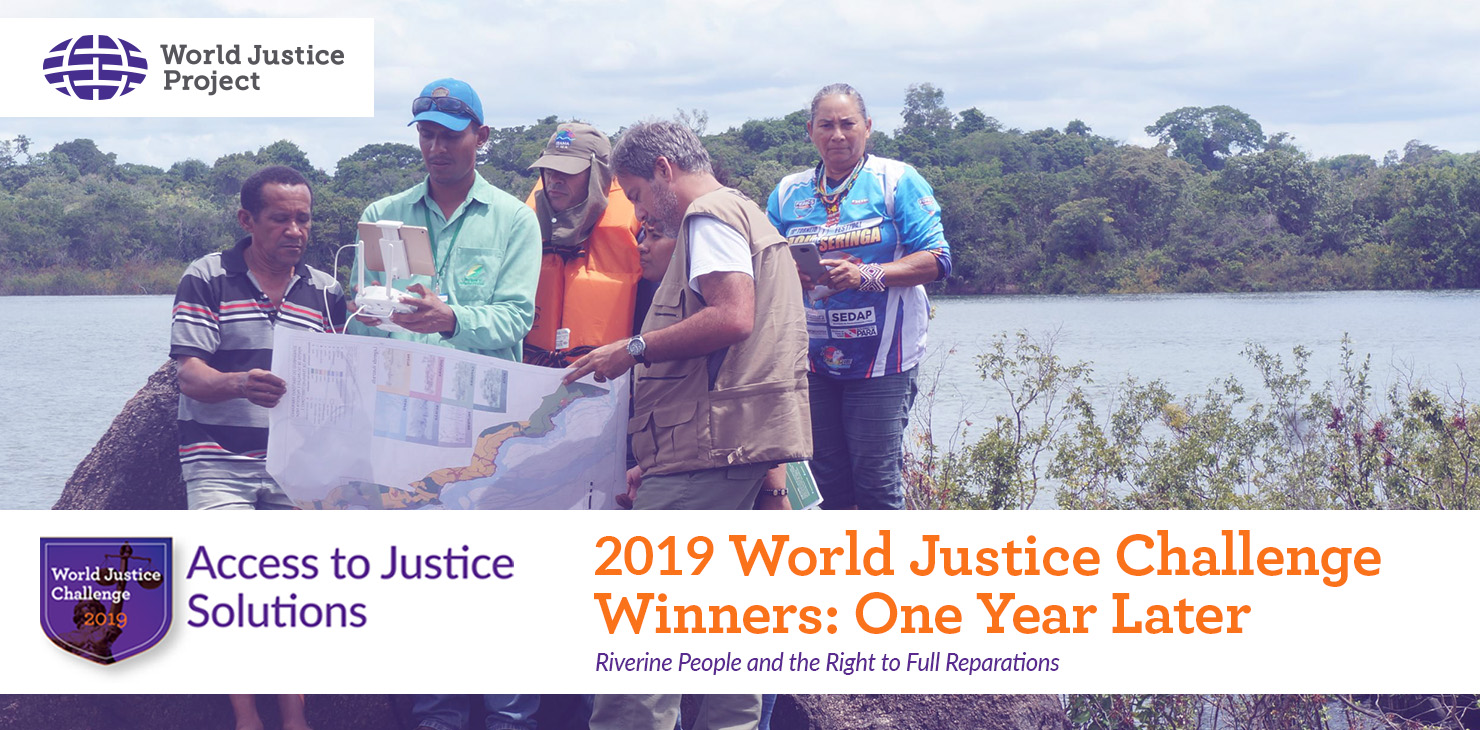

One year ago, the World Justice Forum 2019 concluded with the announcement of the winners of the 2019 World Justice Challenge: Access to Justice Solutions. To mark this occasion, WJP is catching up with each winning project to learn how their work has evolved over the past year, the challenges they face, and how the World Justice Challenge prize money has bolstered their work.
Riverine People and the Right to Full Reparations
Instituto Socioambiental, Brazil
In 2015, 300 families who lived on the islands and banks of the Xingu River, state of Pará, Brazil, were forcibly displaced from their homes to make way for the reservoir of Belo Monte hydroelectric power plant. This project, through strategic advocacy and a broad negotiation with the Brazilian government and the corporation building the dam, was able to influence the elaboration and implementation of an adequate reparation policy for traditional populations impacted by large infrastructure projects.
What has changed for the Riverine People and the Right to Full Reparations project in the last year?
Over the course of the past year, the federal government of Brazil has finally approved the reparations project. However, since then the project evolution has been very slow, due to delays put in place by Norte Energia S.A., the company which had built the dam. As a result, the return of the displaced families to their original land has still not taken place.
What challenges has the project faced?
Norte Energia has caused excessive delays to the project's implementation. Besides disagreements between the government and the company, Norte Energia has also been using a delay strategy whereby the project requires the acquisition of land bordering the Permanent Preservation Area of Xingu's reservoir, which involves high costs, and clashes with agribusiness leaders in the neighboring city. So, the government project that would allow families to return has not been realized yet.
This has been compounded by the 2019 political transition in Brazil to a government led by Jair Bolsonaro, which has empowered political groups directly connected to agribusiness, which back the Norte Energia project and oppose the safe return of the riverine people to their territory on the Xingu river. People who have returned to the protected area are being treated as trespassing criminals by Norte Energia, which is forcibly removing them and attacking them in court.
As a result, the impact of the project cannot be truly measured until the families are allowed to return to the Xingu River. However, the Riverine Council is now the main interlocutor with the government and Norte Energia, strengthening their position as an essential actor in this process.
How has winning the 2019 World Justice Challenge made an impact on the project?
The prize money was used to fund a documentary retracing the story of riverine people and their displacement along with documenting the social and political process that is fighting for their return. This documentary is in the final editing phase. Once the documentary is released, it will be critical in raising awareness about the issue and hopefully drive the implementation of the return project.
"ISA's participation in the World Justice Forum and World Justice Challenge was important (in giving) international visibility to the riverines' case, in networks that work with human rights and the cause of forced removals of traditional population […] It was also an important opportunity to learn about similar initiatives around the world, bringing inspiration and innovation to the project, especially from a technological point of view."
Learn more about Instituto Socioambiental and the Riverine People and the Right to Full Reparations project in WJP's Program Library.
The winning projects of the World Justice Challenge 2019: Access to Justice Solutions were among 30 finalists chosen from over 250 applications from around the world at the World Justice Forum in The Hague. They each represent innovative efforts to bring justice to individuals and communities that have seen little of it in the past. We are pleased to share their latest work with you and to encourage the rule of law community to participate in our upcoming World Justice Challenge 2021. Stay tuned for a 2021 Challenge announcement coming this fall.






